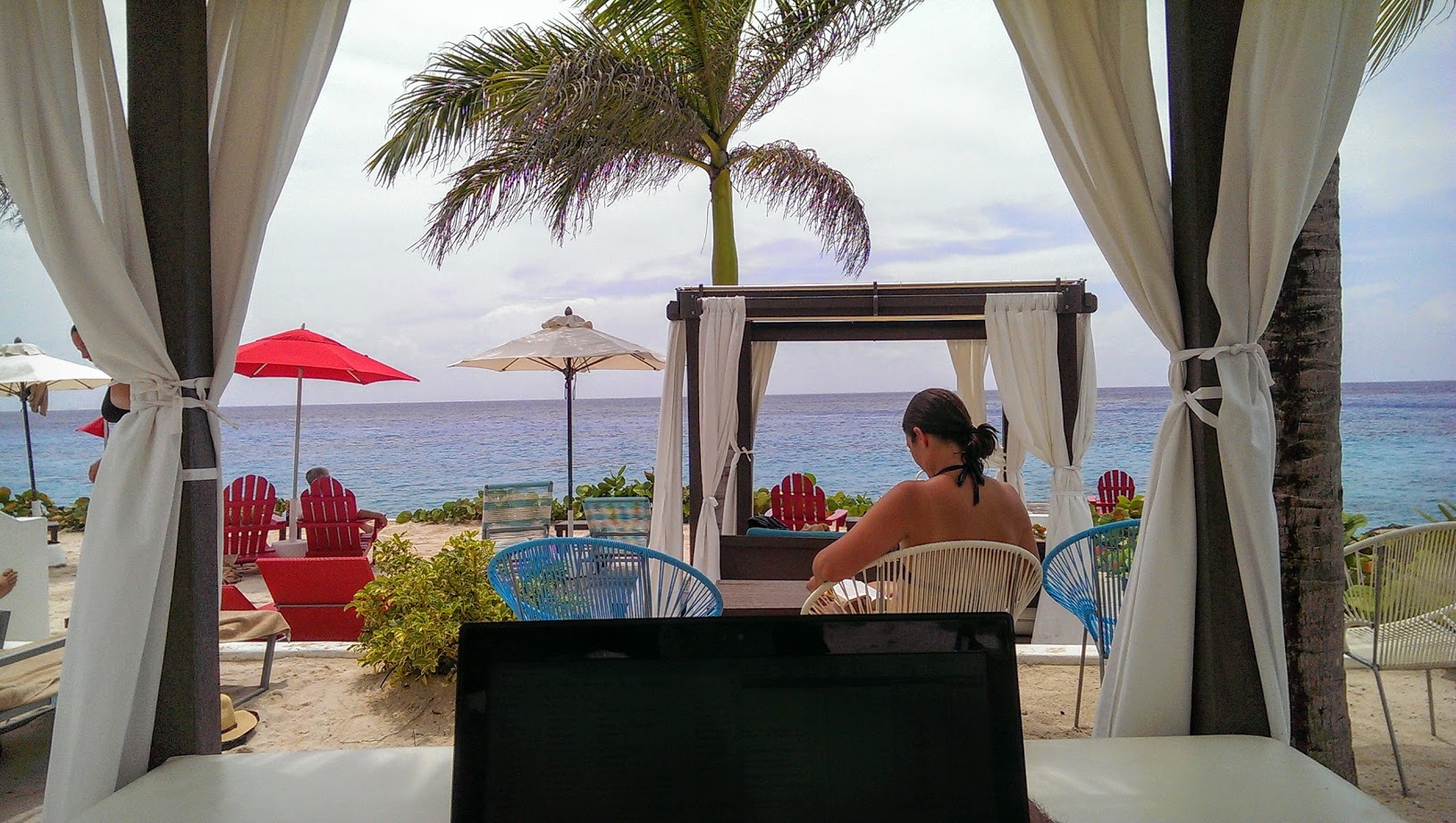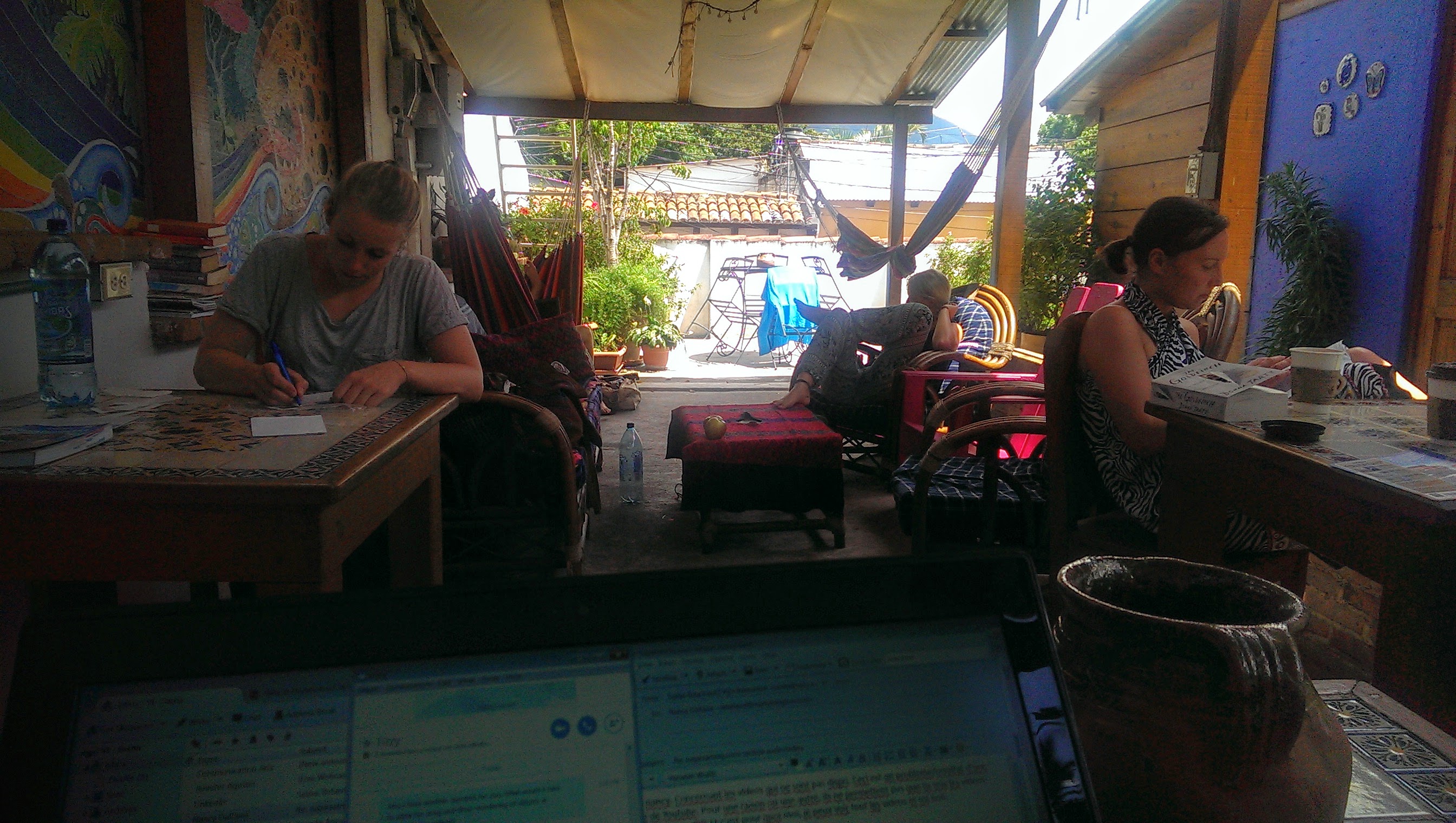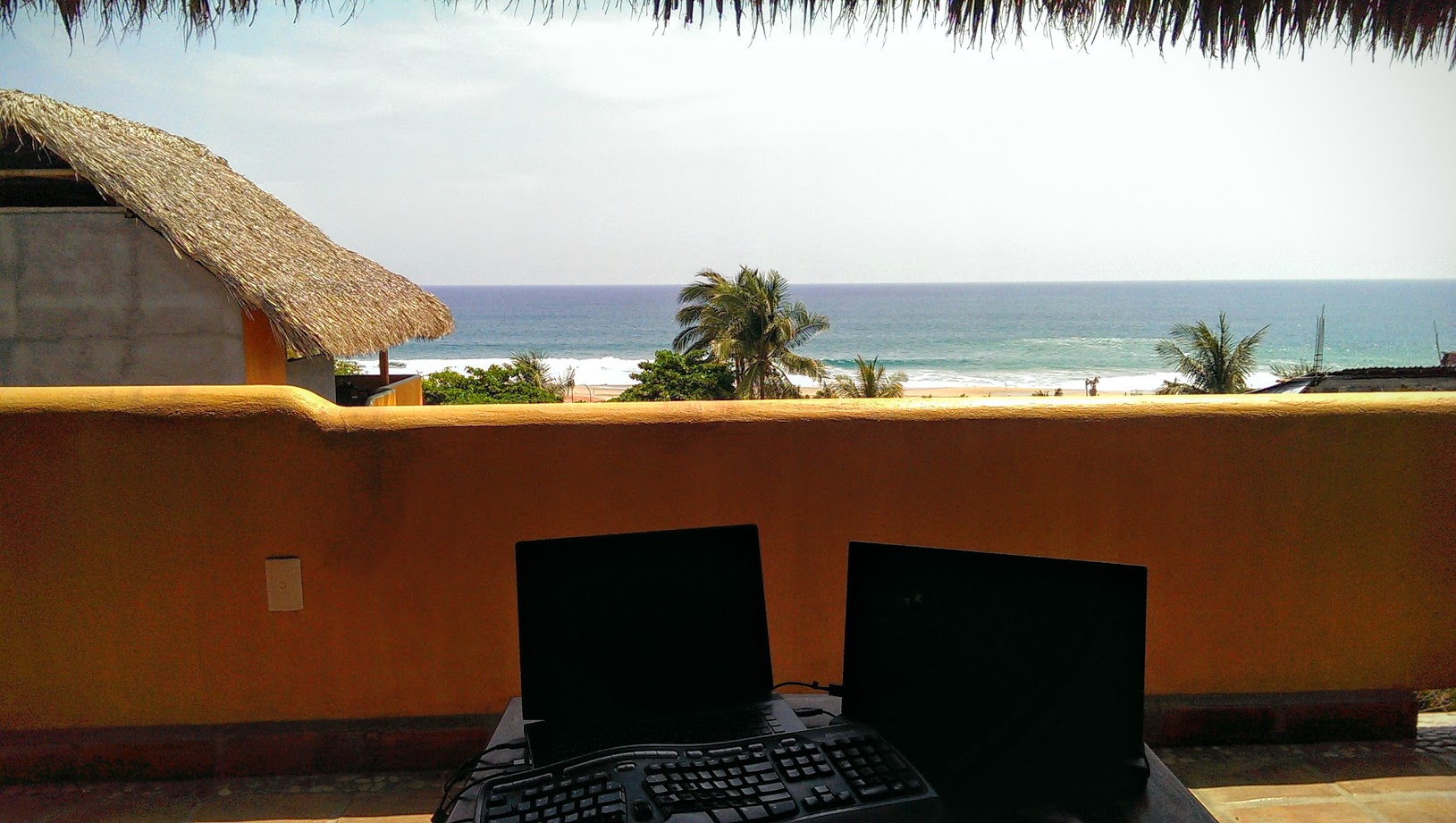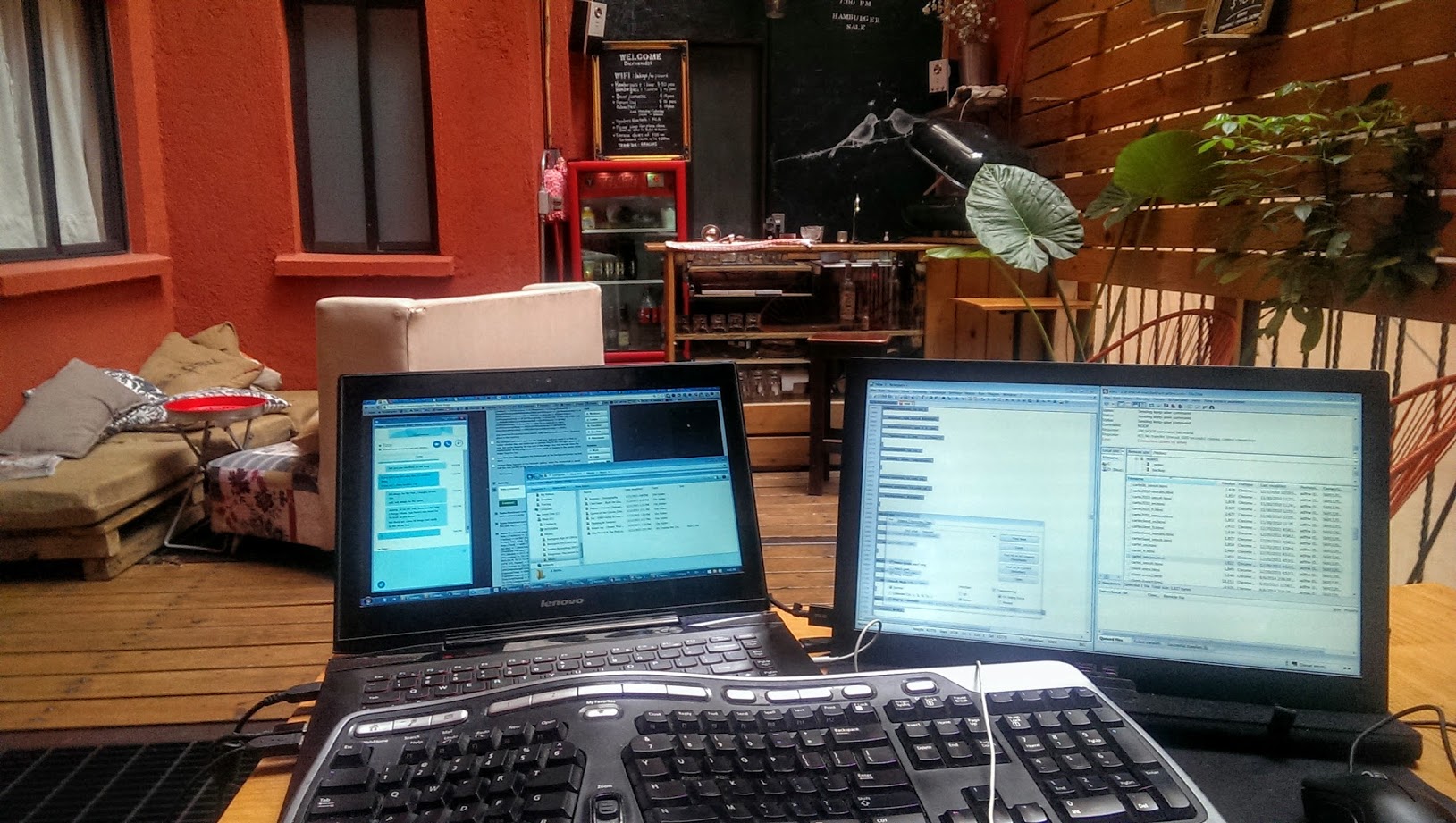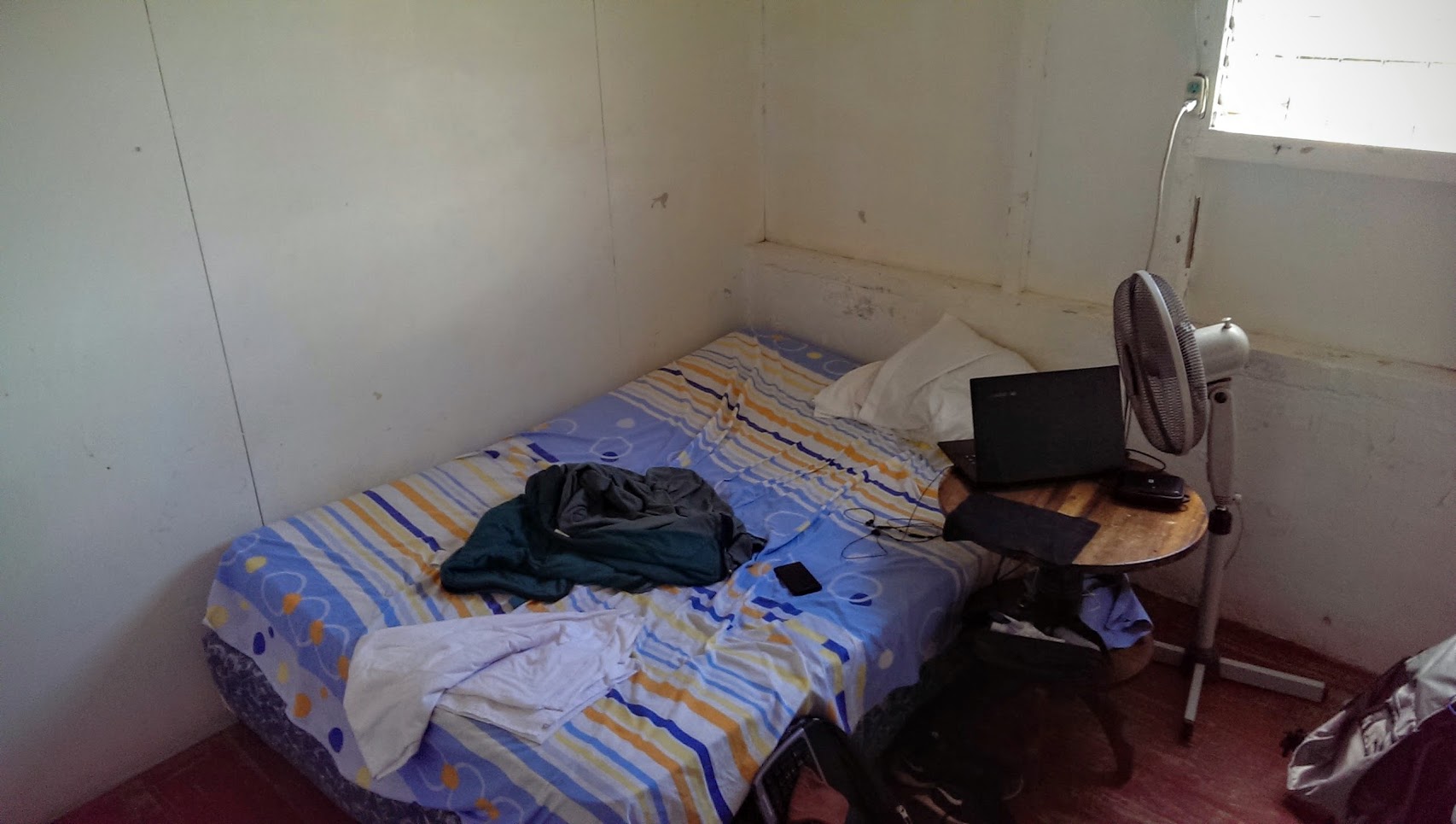Being a digital nomad sounds awesome.
Well, it kinda is, but it’s also a lot more stressful than you might think. Granted the nomad life means you get to travel the world and set up your office in some pretty spectacular places. Whether on a rooftop covered palapa overlooking the Pacific or a hotel room balcony overlooking the Carribbean, the flexibility we have as digital nomads is unprecedented in human history. Being able to go from country to country setting up shop where you want, experiencing the cultures, activities and adventures that each destination has to offer is something that cannot be overstated for how awesome it truly is, but let’s be honest, this isn’t for everyone. Here’s a list of stress points, annoyances and potential deal-breakers. And some potential solutions that have so far worked for me.
Stresses of the nomad life
1. Security. You’re never more insecure about traveling as you are when you’re lugging your sole source of revenue around with you wherever you go. You leave your hostel dorm, hotel room or airbnb and the safety of your stuff is always in the back of your mind. You know that if your stuff gets stolen it could easily spell the end of your trip. Losing your computer, hard drives and other is something you’re constantly worried about. Of course that’s in addition to any credit cards, bank cards, passports. So for the digital nomad, there are special considerations. If you’re a paranoid person, this may not be the life for you. You need to be able to walk away and let life flow.
2. Internet. Sure, everywhere says they have internet but sometimes you get somewhere and well, what wifi they have to offer hardly qualifies as internet. Some places offer wifi only in select parts of the property, or the wifi signal is either poor or the throughput is so bad, you can hardly load a webpage. You need to be ready and willing to adapt. You’ll bitch and moan and you’ll likely need to to relieve the frustration, but in the end you have to let certain things go, or be proactive and find solutions. Sometimes it might require heading to an internet cafe and paying for access, others might require finding a spot where you’re essentially stealing internet. Whatever works. No one goes to jail for stealing wifi, so don’t worry about that. But you’ll soon find that you are much more limited in what you can do and where you can go due to internet. Think you can spend 2 weeks in the jungle? Not likely. Not if you have a company to run or someone to answer to. Sure you can take a week off here and there, but do that too often and you’ll find your sources of revenue quickly slinking away. The search and need for reliable internet is by far the greatest limiting factor of the digital nomad life. And if you’re on a budget, your options are even more limited. Hostels, even those offering private rooms may have wifi, but you might find the quality so low that you essentially can’t get anything done. The point is, internet will rule your life. It’s sad but true. So you’ll need to be adaptive. There are some solutions you might find helpful, but again it all depends on the type of nomadism you plan on engaging in.
3. Work. I’ve never been a 9-5er. My schedule has always been flexible and some would say heavily influenced by vampire biology. I sleep late and wake late. But this isn’t new. It’s been the case since I started working. But on the road, this can present some challenges. Working when others are trying to sleep can feel uncomfortable, or sleeping while others are running in and out of the room or packing can be annoying. These issues may not apply if you only stay in private rooms or are staying in AirBnbs or hotels, but in a dorm, it can be problematic. But aside from the schedule issues, there’s are a few others. Finding a proper place to work isn’t always obvious. Many, even most hostels don’t have a designated desk or office area. So again flexibility is key. In some hostels, you may find the only place available is your bed. Let’s just say, designing a website from bed is less than optimal. Another issue is focus. Staying focused when people are around can be difficult. If you’re easily distracted you may find hostels to be a no-go zone for work. It’s up to you to manage your time and focus and that’s not necessarily something everyone is good at. Conducting skype conversations or VOIP phone conversations with clients when you have no control over other’s behaviors is stressful. I once had a skype video call while 2 of the hostel parrots were screaming at the top of their lungs. It was awkward and unprofessional to say the least, but sometimes things like that come up. People may not realize you’re in a meeting and come up and start talking to you. It can be tense. And lastly, and this applies equally to point #1 – security, the possibility of losing all your work due to a hardware failure or loss/theft of your laptop and hard-drives is a regular source of stress.
All of this adds up to a completely different type of traveling than 95% of the people you’ll meet during your journey. Granted, most digital nomads don’t live the lifestyle that I do. From what I’ve gathered the vast majority of digital nomads don’t move around as much as I do. Most seem to stay in one place for months, then move on to another place, renting an apartment almost everywhere they go. Some seem to have more defined plans and know generally how long they’ll stay in a particular area. I thought this would be me as well, but it hasn’t turned out that way, and that makes things even more precarious. But, I have found ways to mitigate the dangers and reduce my anxieties. Here are some of the solutions I’ve found.
Some solutions/tricks
1. Security. At the end of the day, this is a luck of the draw type of thing. At some point luck might just run out, but there are things you can do to stack things in your favor. For one, buy a lock. Many hostels and hotels offer lockers. Use them. Any deterent is better than nothing. Secondly, use decoys. Place your less important items in more obvious places and hide your more important items in random places most people wouldn’t think of. Keep in mind, someone breaks into a room with the intention to steal, they probably won’t look in all the nooks and crannies of the place. They want to get in, find something of value and leave as quick as possible, so hiding stuff in places that aren’t obvious is a good way to escape potential loss of gear. For example, I always put my laptop in some random place. In some cases, it’ll be under a nightstand, or behind a curtain. Let them steal my less important stuff that is more readily available, but who’s going to lift the nightstand or pull a curtain to see what’s behind it. I do this with passports and other stuff too. It’s up to you to adapt to your surroundings and what’s in the room but there’s almost always a place to hide your most important stuff. And if the rest of your stuff is all more or less out for the taking, the obvious thing for a thief to do is take that and not look much further.
2. Internet. Well, again, internet cafes might be a good option. Asking restaurants and other establishments for their wifi passwords and keeping them on record is another option for stop gaps. I can’t tell you how many wifi passwords I have for networks around Central and South America. A good tool also if you have more than one device is to use a Wifi password recovery app. I personally use Wifi Key Recovery on my android. If I put a password in once, I can retrieve it and enter it into any other device. It’s saved me numerous times. Also, using the speedtest app might help you weed out useless networks. Another helpful tool is a VOIP phone. Obviously occasionally you might have to communicate with your clients/boss. A VOIP phone may not provide excellent quality, but it can come in handy and provide clients with a sense that at the very least you are reachable. Additionally, if you’re staying in a country for a couple weeks or more, getting a local SIM card is probably worth it. Most countries will sell you one outright with a prepaid plan for pretty cheap (under $20 USD for 1-2GB of data). Use it as an emergency option, for Google maps, occasional checking on emails, skype, etc and you’ll find it providing a level of security for a very small investment. One last thing, and this doesn’t always work. When you book a place in advance, let them know what your requirements are and if in doubt, ask them to do a speedtest using speedtest.net. It’s super simple and they can share the results with you and you’ll have a good idea what to expect. Of course the problem with running one test is that you don’t know if that’s a good sample of what to expect, but if you get a really low result, you can be pretty sure that internet there isn’t going to cut it. Not all places will do this, but it’s worth asking. You’re not being a princess, you just have different needs. It’s fine.
3. Work. Don’t get me wrong, I have serious ups and downs in this department. I have periods of great productivity and others where I hardly get anything done for weeks. Part of that depends on the hostel I end up in, the city, and which people I meet. Sometimes it’s also affected by the time of year and whether most locals are on holiday or not. In terms of my schedule, well, there’s not much I can do about that. I don’t fight it. I do my best to get work done when I’m feeling focused or have deadlines and I don’t push myself too hard when it just doesn’t feel right. If I find a good place to work, I go there often and sort of informally claim it as mine and most people leave it for me even when I’m not there. Given that I tend to stay in places much longer than the average traveler, I’m usually there when people first check in and there when they check out. So I end up being that guy who works in that space. If I have to work from bed, I do. I try to keep it as quiet as possible, but generally I find a spot somewhere in a communal area to get things done. If a hostel really doesn’t accommodate working, I’ll move to another. There’s never a shortage of hostels in any given town. To stay focused and avoid distraction, I put my headphones on the entire time that I’m working. This creates a barrier between my work and the world around me and in general people leave you alone when you’re at your computer with a headset on. Sometimes I don’t even play any music, I just leave the headphones in. Sure it’s anti-social, but I don’t always want to be social and getting work done takes priority (sometimes). So, in general I’m quite good at avoiding distractions. And this also helps create a precedent, and discourage people from coming up to you while you’re on a Skype call or other. They see you at your computer in the same spot for a couple hours or a couple days and they quickly get that you’re doing something serious and they tend to leave you alone. So, I determine when I’m going to be social, not others. Of course you have to be ready to deal with the unexpected at times, if you’re on the phone and a parrot starts squawking. Not much you can do about that. Honesty is your best tool in that case and if you can move somewhere else, do it. As for losing work due to hardware failures or loss/theft, well, here redundancy is key. On top of my laptop which holds all my latest projects, I have 3 hard drives as backups. Hard drives these days are tiny and light, so it won’t take up much room in your bags. I have 2 in my main backpack and one in my day pack, this way even if I lose one of the 2 bags, I still have one backup with all my work. Redundancy and not keeping all your eggs in one basket. But, as if that weren’t enough, I also purchased a 1TB Google drive cloud account that automatically syncs my work as soon as I save anything, and so I have have all my work backed up to the cloud so that EVEN if both my bags are stolen, I still have a copy of all my work and can access it from any device, including potentially a hostel computer or my phone. And this means in theory, even if I lose my laptop and all my bags, I can still quickly buy a new one and be up and running again within a day or 2. At $10/month for Google Drive, it’s well worth it. Ya, 4 backups may be a bit anal, but these solutions have greatly minimized my level of anxiety and stress.
As mentioned, the nomad life and/or digital nomadism is a different kind of traveling and a different kind of lifestyle. It’s not suitable for all, requires a certain amount of discipline and patience and can be abnormally stressful but there are ways to manage the risks, reduce your discomfort and make the most of the situation. In the end, don’t ever forget how lucky you are to be able to live a life of complete geo-independence and still make a living, see new things, meet new people and still have the security of a stable income and the luxury of all the time you want to live this type of life. It’s a beautiful thing if you can find the right balance. I highly recommend it. I will say one thing, if you can deal with these three issues in particular, not to mention the loneliness, general insecurity, constant moving, and the reality that 99% of the people you meet will be gone within days, then you are going to have the time of your life. Additionally, you’ll have “offices” in the most incredible places. Doesn’t sound too bad now does it?
A LOOK AT SOME OF MY “OFFICES”
